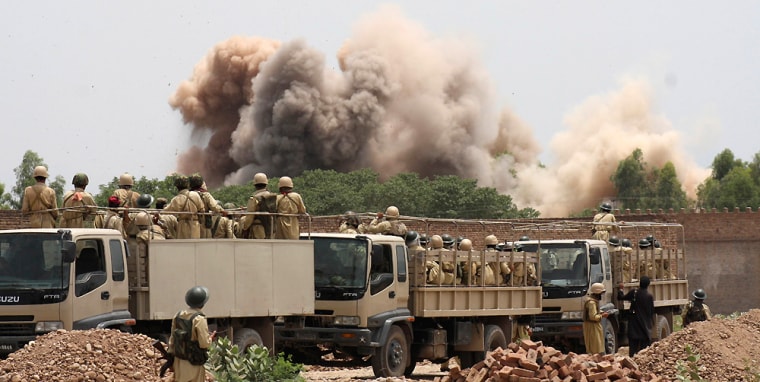Paramilitary troops returned Sunday to posts they had abandoned months ago in the Khyber region as Pakistani forces widened their offensive against militants in the volatile tribal area along the Afghan border, an official said.
Prime Minister Yousuf Raza Gilani said the government was forced to take action because it faced an "immediate problem" from militants near the city of Peshawar and in the Swat Valley.
The government launched the operation Saturday after the militants began threatening Peshawar and ambushed supply convoys bound for U.S.-led coalition troops in Afghanistan.
Troops from the paramilitary Frontier Corps, backed by tanks and armored personnel carriers, quickly cleared militants out of the Bara region, said Muhammad Siddiq Khan, a local official.
A tribal paramilitary force that had been forced to abandon its posts in the region several months ago returned to the checkpoints Sunday, he said.
The Frontier Corps met no resistance as it moved into other areas outside Bara, destroying militant bases along the way, he said.
On Saturday, authorities shelled militant hide-outs and blew up the headquarters of militant leader Menghal Bagh, who had apparently fled. The operation was also expected to target Haji Namdar, whose Vice and Virtue Movement is suspected of attacks against coalition soldiers in Afghanistan.
Shift in strategy
The Khyber offensive appears to be a shift in strategy by Pakistan's new government, backing its calls for peace deals in the tribal areas with the threat of forceful action against militants who get out of line.
Speaking to reporters in Lahore, Gilani defended the peace deals, but warned that authorities will resort to force "if (the groups) backtrack from their agreements and damage state property."
The United States has said peace deals will give militants the freedom to regroup for attacks on U.S. and NATO forces in Afghanistan.
Afghan officials welcomed the operation in Khyber and reiterated their suspicion that a surge in violence in Afghanistan was partly due to the lack of pressure on militants in Pakistan's tribal areas.
"We endorse this operation, we want this operation to be continued and we want this operation to be successful," Afghan Defense Ministry spokesman Gen. Mohammad Zahir Azimi said.
NATO spokesman Brig. Gen. Carlos Branco said "everything that can minimize the threat in Afghanistan is good for us."
"We know that as long as insurgents can operate safely on the Pakistan side of the border, then there cannot be security in Afghanistan," said Mark Laity, another alliance spokesman.
In the wake of the offensive, Baitullah Mehsud, the top Taliban leader in Pakistan, said he was suspending talks between his allies and the government and implied his forces could cause trouble in Pakistan's main cities.
Maj. Gen. Alam Khattak, head of the Frontier Corps, hinted this would not be the only operation against militants and other officials said the volatile Swat region could be next.
On Sunday, a remote-controlled bomb blast killed two soldiers on a foot patrol in Swat's Matta area, a former militant stronghold, army spokesman Maj. Gen. Athar Abbas said.
Pro-Taliban fighters have battled security forces in Swat in recent months, despite a peace deal between militants and the new provincial government.
